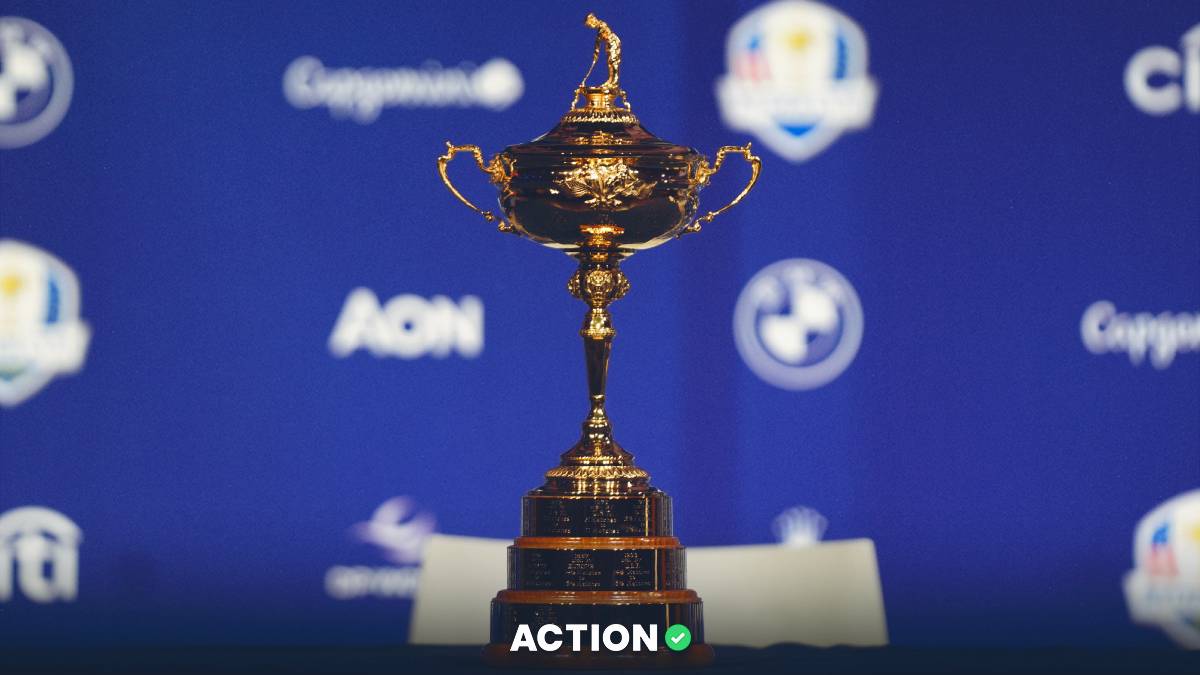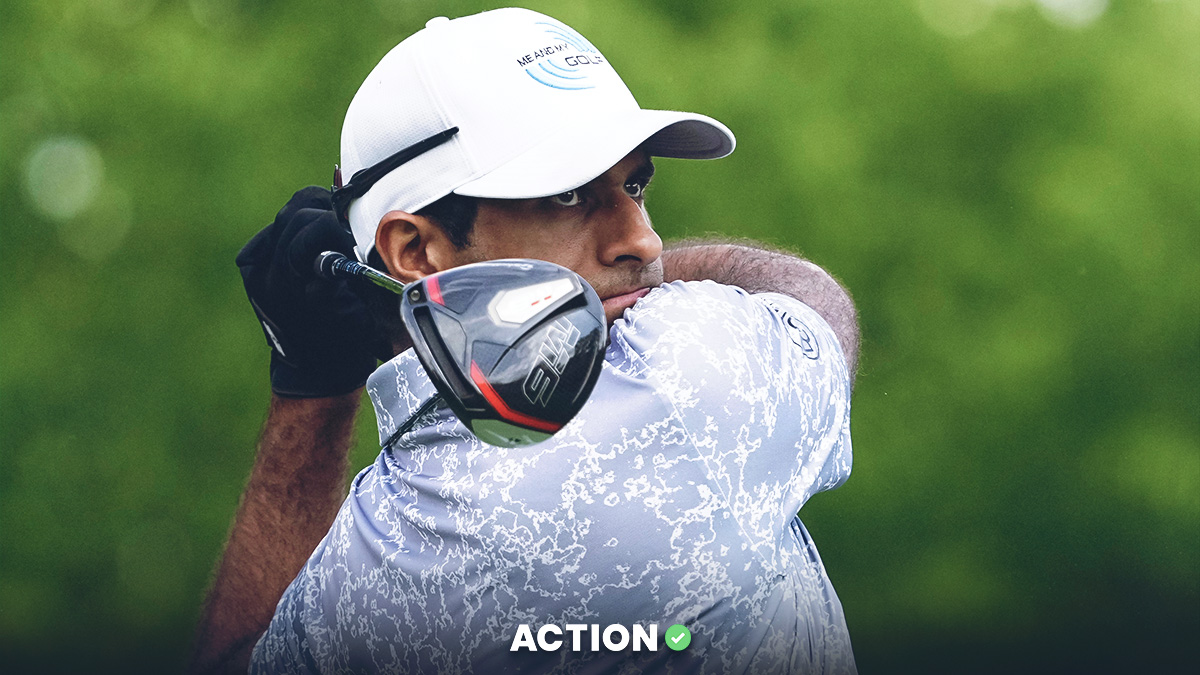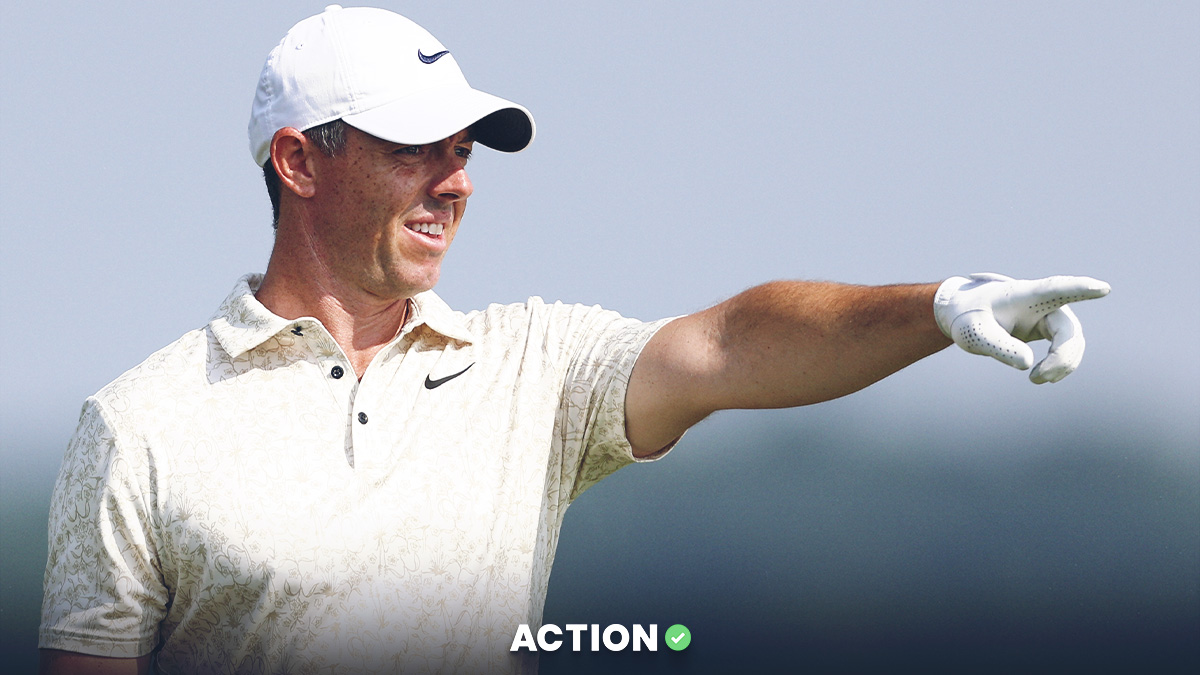- When playing golf with your buddies, the itch to have a little side action will inevitably come up.
- Here are the rules for some of the best golf betting games to play with your friends, including Nassau, Skins, Hammer, Vegas, Wolf and more.
I love gambling and I love playing golf. Unfortunately, I'm not quite as good at either as I'd like to be, but thankfully two other members of The Action Network, Drew Stoltz (aka "Sleeze,” a former pro) and Peter Jennings, who co-host the PGA Flex podcast with me, crush at both. There are not many things better in life than spending a couple hours out at the local course, drinking a few and gambling on holes with your buddies. On that note, here are 10 fun gambling games you can start playing today, organized by beginner, intermediate and advanced.

Beginner Games
1. Skins
How to play: This is one of the most popular golf games. It's simple match play: Each hole is worth a set number of "skins" — it can be the same number for each hole or escalate throughout the round (maybe each hole on the front nine is worth 10, 10-17 are worth 25, and No. 18 is worth 50) — and whoever has the most skins at the end of the round wins whatever the pot is. Holes carry over the skin value, so if two players shoot par on a 10-skin hole and the other two shoot bogey, the next hole is worth 20 skins to all players.
Best for: Groups of 2-4. If golfers differ in skill, you can factor in handicap for the hardest holes; for example, if the best player is an 8 handicap and the second-best player is a 16, the latter would receive a stroke on the eight hardest holes.
2. Two-Man Scramble
How to play: If you've ever played in a charity golf tournament, this is likely the game you've played. The rules are simple: Divide your foursome into two groups of two. Each hole is match play, with the caveat being you always hit from the best shot on your team. So if you slice your drive into the woods but your partner smacks it straight down the fairway, you would both shoot your second shot from the more advantageous location. The winning team in terms of strokes (or you could make it skins-based and do it by hole) wins the pot.
Note: This is close to "best ball," which is where players take their own ball and then the team takes the lowest score of the two golfers.
Best for: Groups of 4. If golfers differ in skill, it's usually best to pair up the best and worst golfer to even out the teams. This might not be the best game if one golfer is far-and-away better than the other three, however.

3. Best to Next
How to play: This is a team game like best ball, where players take their own shots but play as a tandem. The difference is that ties are broken by highest individual score. This is a good game to prevent a lot of ties on each hole. If one team goes 4-4 and the other goes 4-5, the former team wins.
Best for: Groups of 4. This is a good counter to best ball or two-man scramble, in which one elite golfer can carry his team in a group of 4. Especially on par-3s, the high score is going to come into play.
4. Nassau
How to play: This game is simple: You have three separate wagers on the first nine, back nine and the aggregate 18 holes. Lowest score on each of those wins. What makes it different than just regular match play, however, is that you can "press," which essentially ends one of the front or back nine bets and starts a new bet. A player/team can press when down two holes. For example, if a team is down two holes after six holes, they could press, which would end the front nine bet and create an additional wager on holes 7-9. Many people play that you have to press if you fall down by two holes.
Best for: Groups of 2-4. You can play as teams or individual golfers.
Intermediate Games
5. Hammer
How to play: This might be the most fun game on this list. This game is played 1-on-1 or 2-on-2. You create a set pot for each hole, let's say $10. At any point to start the match, one player/team can "hammer" the other, which the other team can either "fold" — which means they lose the $10 and the hole is over — or the hole doubles in value to $20. Let's say Team 1 hits a shot in the rough off the first tee while Team 2 hits it in the fairway. Team 2 would likely hammer it to $20, but if Team 1 then hits a beautiful shot out of the rough to five feet from the hole, they can then hammer back the other team and make the hole worth $40. Back-and-forth it goes: If Team 2 then puts it to 10 feet from the hole and subsequently drains the putt, they would re-hammer Team 1 and make them drain their five-foot putt for $80. Talk about pressure putts.
Best for: Groups of 2 or 4. Must have an even number to play as teams of 1 or 2.

6. Vegas
How to play: This game is for a group of 4 and is similar in structure to "Best to Next." The difference is you create a double-digit number for each team's score, with the lowest number first. For example, if one team shoots 4-4 on a hole and the other goes 3-7, the scores would be 44 and 37; the latter team would win. The one exception is that if a player shoots a 10 or higher that number goes first; for example, a 6-10 would be 106 instead of 610. Set an amount for each hole, and the lower overall number wins.
There are some fun variations, too. Sleeze plays that teams are decided each hole by pairing up the two players who hit their tee shots farthest to the left and right, respectively. Also, Sleeze plays by counting each point as a unit. Let's say you're playing for $1 per point. If a team shoots 4-4 and the other team shoots 5-6, then the former team would be 12 points (or $12) up on that hole — 56 minus 44. One more caveat is that if a team makes a birdie as their best score and the other makes a par, the latter team must inverse their score. So if Team 1 had a score of 3-6 and the other had a score of 4-7, Team 2 must invert their overall number to 74, which means Team 1 would be up 38 points — 74 minus 36 — on that hole.
Best for: Groups of 4. This game is good for a group in which there are differing skill levels, especially for one player.
7. Banker
How to play: This is a fun one, although it starts to get a little complicated. This is a game for at least 3 people, and to start you must set a minimum and maximum amount on each hole. Let's say it's $5 min and $50 max. Choose a banker for the first hole, and it'll rotate each hole. The banker tees off last for each hole, and each player determines how much they want to play the banker for that hole. For example, if Player 1 is the banker, Player 2 can choose to play him for $30 on the hole, Player 3 can choose to play just $5, while Player 4 can play him for $50. Players 2-4 are not playing against each other at all; they're all playing individual matches against the banker. Lowest score on the hole is the banker for the next hole, and ties are broken by the longest putt.
You can also press in this game, but only off the tee and before the banker hits. For example, if Player 3 hits it in the fairway, he can choose to press his $5 bet to $10 before the banker tees off. The banker can press back after hitting off the tee, but he must press everyone — not just whoever pressed him initially. In this scenario, Player 2's bet would now be $60, Player 3's bet would be $20, and Player 4's bet would be $100 (assuming Players 2 and 4 didn't press off the tee).
Best for: Groups of 3 and 4. This game rotates banker and creates drama off the tee. Further, this game is good for players who have differing bankrolls. One player can keep his bets at just a couple bucks, whereas the high rollers in the group can play for more money if they wish.
8. Wolf
How to play: This is a fun one and allows players to create different teams throughout the round. In a group of four, designate an order for who is the "wolf" and rotate that order throughout the round. The wolf always goes last on every hole, and the designation means you get to choose how you play the hole. You can elect to play 1-on-3 or pick a partner and go 2-on-2. The caveat is that the wolf must make his or her decision right after each drive. Let's say Player 1 is the wolf and Player 2 hits a long drive in the middle of the fairway. Player 1 must decide before Player 3 hits if he wants to partner up with Player 2. If not, Player 3 hits and he has the same decision. After Player 4, he can partner with him or play 1-on-3.
Each hole has a set amount on it, let's say $10. If Player 1 partners up with Player 2 and they win the hole, Players 3 and 4 must each pay $10 to the other team. But if Player 1 elects to go 1-on-3, the bet doubles. If Player 1 wins the hole, Players 2-4 must each pay $20 to Player 1. Likewise, if Player 1 loses, he must pay $20 to Players 2-4.
Where it gets really crazy is if Player 1 is feeling confident and elects to go "lone wolf." That means he chooses to go 1-on-3 before any tee shots are hit, rather than at the end. In this case, the bets all triple to $30. It's high risk but also very high reward.
Best for: Groups of 4. You can play straight up or by handicap, which certainly affects the strategy of who you pick when it's your time as the wolf.
Advanced Games
9. Scotch
How to play: This is a team game in which there are multiple ways to win on each hole. The most popular version is five-point scotch, in which there are five separate bets going at a time:
- Lowest score on the hole
- Total score on the hole for the team
- Closest to the pin in regulation (must be on the green)
- Lowest number of total putts
- Birdies
If two players make a birdie, it would cancel the bet for all players. Likewise, if both teams score a 4, there are no points awarded for lowest score on the hole.
Set a fixed amount for each point and divvy up money at the end of the round. Presses are encouraged, as explained above. In addition, there are many variations to be found, including "keep/take" — if Team 1 wins the most points on the second and third holes, they would get an extra bonus point for "keeping" points on hole 3; if Team 2 lost hole 2 and won hole 3, they would win two bonus points for "taking" points on hole 3 — and extra points for eagles. There's really no limit to rules you can add, so make stuff up with your group and see if you like it.
Best for: Groups of 4. This game can be hard to track considering there are multiple ways to earn points, but it does make it exciting and allows players to feature certain parts of their game. You can add points like longest drive or longest putt as well.
10. Wolf Scotch
How to play: Sleeze likes to play "Wolf Scotch," which is a combination of — you guessed it — wolf and scotch. He typically plays each hole as having eight possible points:
- 2 points for low ball (lowest individual score on the hole)
- 2 points for low total (sum total of team score)
- 2 points for a birdie (if no birdie is made, no points are rewarded and no blitz is available)
- 2 points for proximity (closest to the hole, must be in regulation)
Teams can win anywhere from 0 to 8 points on the hole and up to 16 if they blitz all categories. That refers to one player or team winning all points on a hole, which would then double. For example, if each point in wolf scotch is worth $5 and a team blitzes the other, they would win 16 points, or $80, on the hole. You don't want to be blitzed.
Plus, you can integrate wolf rules into the game, where one player is competing against the others and can choose to go 1-on-3, 2-on-2, or lone wolf. Scores are multiplied on the low total category.
Best for: Groups of 4. Like scotch, it can be hard to track the points, but it makes for crazy decisions and a ton of fun on every shot on the course. Put simply: It's a golf gambler's dream.
Have a favorite game not mentioned here? Shoot me a note at my Twitter @bryan_mears or email at bryan.mears@actionnetwork.com and I'll do a follow-up post soon on favorite games from The Action Network community!
























































